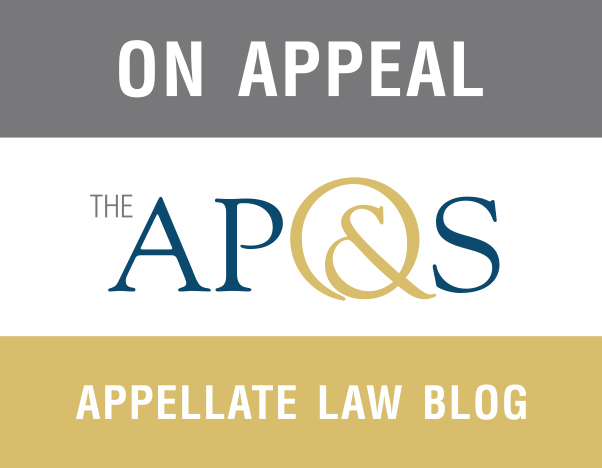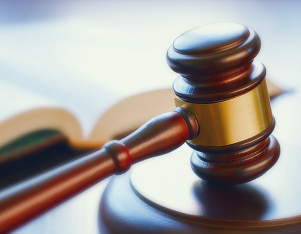 This special edition of the Fast Five on Rhode Island Appellate Practice features guest bloggers Jamie J. Bachant, Esq. and Amy Goins, Esq., who recently completed clerkships with Rhode Island Supreme Court Justice Gilbert V. Indgelia. Ms. Bachant is now a litigation associate at Adler Pollock & Sheehan P.C. and Ms. Goins is an Assistant City Solicitor with the Providence Law Department. In this edition, Ms. Bachant and Ms. Goins share their insight and pointers for practice before the Rhode Island Supreme Court.
This special edition of the Fast Five on Rhode Island Appellate Practice features guest bloggers Jamie J. Bachant, Esq. and Amy Goins, Esq., who recently completed clerkships with Rhode Island Supreme Court Justice Gilbert V. Indgelia. Ms. Bachant is now a litigation associate at Adler Pollock & Sheehan P.C. and Ms. Goins is an Assistant City Solicitor with the Providence Law Department. In this edition, Ms. Bachant and Ms. Goins share their insight and pointers for practice before the Rhode Island Supreme Court.
(1) HOW TO APPROACH THE BRIEF.
Law clerks have significant responsibilities in each case that comes before the Rhode Island Supreme Court—from reviewing the lower court record and transcripts, to reading the briefs, to conducting independent research.
Some law clerks will review the entire lower court record prior to reading the briefs; others will read the briefs (or, at least the parties’ recitation of the facts and the question on appeal) prior to such review. Regardless of the order in which the briefs are initially read, one thing is certain: both the law clerks and the Justices will review the briefs numerous times before the oral argument, and many more times prior to the rendering of a decision.
A poorly crafted brief can be a terrible disservice to a party’s argument on appeal. It is very distracting when a brief is unorganized and not formatted in accordance with Article I, Rule 16 of the Supreme Court Rules of Appellate Procedure. Distracting briefs tend to overshadow the actual arguments presented to the court—a reality that sometimes works to a party’s detriment.
The style and framework of the brief cannot be overstated in terms of helpfulness to the court. Here is a valuable rubric:
(1) Briefs should accurately recount the relevant facts and procedural history. Be sure to cite to the transcript and appendix, especially in fact-sensitive cases with voluminous transcripts.
(2) Present the legal question at issue. Make sure that the Court knows exactly what question(s) you are resolving. Arguments raised in the 12A statement that are not later renewed in the full-brief are deemed abandoned.
(3) Discuss the applicable standard of review.
(4) Make your argument. In so doing, apply the standard of review to the question presented. The use of headers throughout the brief can be extremely helpful, especially when the argument is multi-faceted. Remember: the entire purpose of the brief is to point out and explain why the lower court either erred or acted properly with respect to a particular issue.
(5) State the relief you are seeking.
(2) WHAT TO EXPECT AT A PREBRIEFING CONFERENCE.
The Justice assigned to conduct the prebriefing conference will review the 12A statements in advance. Additionally, he or she will read a memorandum prepared by the Appellate Screening Unit, summarizing the proffered arguments and recommending the case to either the show-case or the full-argument calendar.
Typically, the Justice will want to know whether there have been any attempts at alternative dispute resolution. If not, he or she may encourage such attempts going forward. The Justice will also inquire about which calendar the parties prefer for their particular case, and why. Often, this invites discussion about the complexity of the issue(s) before the court. The parties should be aware, though, that the ultimate calendar assignment is not at all indicative of how much attention that case will receive from the Justices and law clerks in reaching a decision. A case assigned to the show-cause calendar is not deemed any less important or pressing. All cases are carefully and thoughtfully reviewed by the Court.
A major take-away is that the prebriefing conference presents a unique opportunity to get some less formal face-time with one of the Justices ultimately deciding the case. It is difficult to quantify how valuable this time in front of the Justice can be, especially in terms of an attorney’s reputation and credibility.
(3) HELPFUL HINTS FOR ORAL ARGUMENT.
It is painfully obvious when an attorney is underprepared for oral argument. The best oral advocates speak conversationally (not reading verbatim from notes) with the Justices during argument and effectively answer the Justices’ questions from the bench. In addition to being responsive to the immediate questions from the bench, advocates should most importantly explain how the lower court erred (or did not err), and how the Supreme Court can rule in their client’s favor while adhering to the applicable standard of review.
All of the Justices come to oral argument very well prepared. Although they each know your case very well and can often recite the facts themselves from memory, it can prove helpful to set the stage for your argument by briefly reciting the relevant facts. However, this is not obligatory. In some cases, the Justices will be quite frank from the bench about whether they deem such a recitation necessary.
As a helpful reminder: not all questions from the bench are critical of your argument. Occasionally, the Justices, persuaded by your argument, ask “soft” questions seeking to help persuade their counterparts on the bench. Be perceptive. More often than not, however, questions from the bench are difficult and critical. It is never a good idea to be combative with the judges. Thoughtful answers are always best.
Lastly, don’t fall down the rabbit hole. If questions start to run astray, kindly and respectfully bring the Justices back to the facts of the case at hand.
(4) DON’T UNDERESTIMATE THE VALUE OF THE APPENDIX.
All of the Justices receive copies of the briefs and the appendices. They heavily rely on their law clerks to review the actual lower court record and the transcripts. Although the Justices have access to the record and the transcripts, they primarily depend on the appendix for their own reading of the relevant lower court documents. It is therefore crucial to make sure that the appendix is well-organized and straightforward, so that the Justices can easily review the material cited in your brief.




